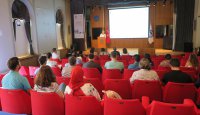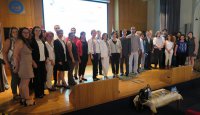The closing meeting of the project was held on July 31,2017 at the University of Sultanahmet Rectorship. Our Vice Rector Prof. Mehmet Akalın, Dean of the Faculty of Business Administration Prof. Nuran Cömert, MITTO Coordinator Prof. Ahu Altınkut Uncuoğlu, İSTKA General Secretary Özgül Özkan Yavuz also participated in the meeting. After the opening speeches,details of the’’Determination of Employment Trends Project In Istanbul’’ were shared.
The main findings of the project are as follows:
Istanbul has 20% of the population and 20% of the employment, while it does not even have 1% of Turkey as its surface area. Compared to other regions, Istanbul is the 5th place in terms of employment, although it is the region with the highest participation in the workforce. Istanbul is one of the most effective regions in terms of labor force and labor force conversion to employment and GDP.
Even though the ratio of women and men in the workforce in Istanbul is equal, there is 0.43 women for employed men and this rate is increasing. Istanbul is a pioneer in women's employment.
Employment in Turkey is getting old. In Istanbul, the population aged 55-64 is growing faster than the youth population, but is the smallest group among the employed.
The young population remains in higher education after graduation, not participating in employment.
While the sectors that created the most employment in Turkey in 2016 were Agriculture, Manufacturing and Wholesale and Retail Trade sectors;Manufacturing, Wholesale and Retail Trade and Vocational and Technical activities were the sectors that created the most employment in Istanbul. Transport and Storage, Information and Communication, Finance and Insurance activities, Real Estate Activities, Vocational and Technical Activities and Culture, Arts, Entertainment, Recreation and Sports sectors are the sectors where Istanbul is the pioneer in sectoral based employment in Turkey. The sectors with the fastest increase in employment in Istanbul in the last 10 years are Real Estate Activities and Professional and Technical Activities. The Information and Communication Sector, which is the pioneer in Turkey, also shows an increase, though not fast. On the other hand, employment in Finance and Insurance Activities shows a decline.
In the last 10 years, the Information and Communication and Real Estate sectors in Istanbul have affected positively the competitiveness and employment at the district level. Spatial decisions and site selection have played an important role in this.
When we look at the employment developments in the world, it has been determined that the dominance of the advanced service sector in the most competitive regions is determinant and it has been determined that the sectoral change in the last 10 years in Istanbul is towards the Advanced Service Sector and it spreads spatially in Istanbul. Istanbul showed 91% activity between 2006-2013 compared to the developed world metropolises.
The factors that played a role in this activity in the last 10 years are as follows;
- Blue- collar occupies a bigger place in employment in Turkey (58%), whereas white collar in Istanbul has a bigger share (61%). It was observed that this mass was composed of younger students in general, and 36% of them were women.
- The manufacturing sector, the sector that provides the most employment in Istanbul, is the third sector with the highest number of white-collar workers. The fact that the majority of white collar workers have business and management, engineering and business education and the third place is in manufacturing sector, indicates that Istanbul is now preferred by the manufacturing sector as a management center, not production.
- While the number of white-collar workers looking for jobs in 2009 was less than the number of employed white-collar workers, the balance was reversed in 2016. In other words, while the supply of white-collar jobs is less than that of the students, the demand for white-collar employment was passed in 2016.
- Most of the job seekers in Istanbul seek job in the first 4 months.
- The job seeking times of young people have been prolonged, and the job seeking times of women have been shortened.
- Part-time work is no longer determined by the needs of the employer but by the conditions of the employee. Flexible work is an option in Istanbul employment.
- Istanbul employment has been affected by the 2009 global crisis, but it has continued to grow in the first 1-2 years after the crisis.
Public, private sector and civil society representatives attended the workshop held on July 10th within the scope of Employment Trends Determination Project in Istanbul. As a result of the workshop participants presented 3 different scenarios:
A) Istanbul will be a service-oriented national and international center: Technology will rise and develop rapidly. The need for educated workforce will increase. Jobs will change, new job types will be created. The lot of the Advanced Service sector will increase. Istanbul will be the center of financial centers and multinational corporations in the coming years. Flexible work will increase, and even if the number of workable jobs remains the same, the number of workers will increase due to part-time jobs. Starting in 2020, advanced service sectors will be the most efficient sectors in Istanbul, will grow rapidly and increase the employment of educated labor force.
B) Advanced Technology and creativity will be transformed: In 2020, information technology will become more effective in industrialization and living conditions, long-term transformation of industrial production models will take place. Technology will create change in production relations, create new employment areas, but some existing employment areas will narrow and cause unemployment. Creativity in Istanbul creates new business areas. Instead of profession, the skills will become the front-line and new concepts of profession among the disciplines will emerge. In a rapidly globalizing world, it is necessary to produce different options in order to reverse the brain migration which may be in Turkey.
C) Advanced Technology-based industry will evolve: economic transformation of Turkey will be directly reflected in employment. By 2020, Istanbul is expected to take some steps to catch up with world standards. Turkey will be discussed about its industrialization thrust and industrial production and technology, which now has an added- value .In the long run, automation of the industry will ensure that production coincides with knowledge and high technology.











